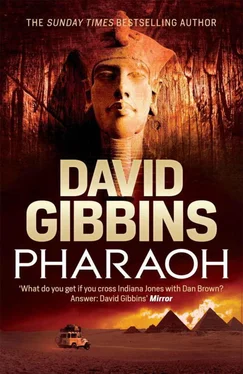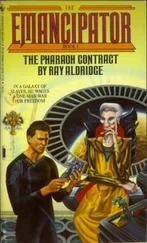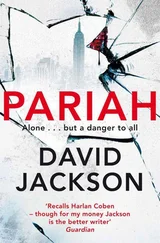The high-pitched whine of an outboard motor approached at high speed from some distance away. When it was over their location, it turned round and idled. ‘Sounds like a Zodiac-sized outboard, sixty or eighty hp,’ Costas said. ‘The only guys out here I can imagine having those will be the police. That’s encouraging if they’ve finally arrived, though I don’t want to ascend into a revving outboard if they’re other people who don’t know we’re here. I vote we swim up along the riverbed to shore.’
Jack nodded, and they set off underwater. After about a hundred metres the riverbed rose to less than ten metres depth, and then it became too shallow to justify remaining submerged. The sound of the outboard was still some distance away, over the site, and it seemed safe to ascend. Costas gave the thumbs-up sign, and they both rose together, face to face, only a stone’s throw from shore.
Jack knew something was wrong even before they broke surface. Pulsating orange lights seemed to revolve in the water, and they heard a loudspeaker in Sudanese. Three police cars with flashing lights were parked beside the Toyota, and the inflatable suddenly revved up and gunned towards them, sweeping round dangerously close and coming to a halt. Two policemen in combat gear were sitting at the back carrying assault rifles, and in between them a Sudanese man in a suit and tie with a police badge on his belt stood up with his hands on his hips, staring at them. Jack flipped back his visor. ‘Do you speak English? Is there a problem?’
The man shook his head and motioned them to shore. Costas was already struggling out of the sludge, and Jack joined him. Unclipping their helmets, they walked into a blaze of lights. Jack shaded his eyes, spotting Ibrahim sitting in a car with a policeman taking some form of statement. ‘Ibrahim! What’s going on?’
A policeman moved up to him and raised his rifle, and Jack immediately put his hands up, followed by Costas. He felt his harness being roughly unclipped and his backpack drop to the ground. Someone grabbed one wrist and then the other, handcuffing them behind his back. He could see that Costas was receiving the same treatment, and they were both pushed forward into the glare. ‘What the hell is going on?’ Jack said angrily to the nearest policeman. ‘Why are we being arrested?’
Ibrahim appeared in front of him, followed by two policemen. ‘Listen to me, Jack. They’re not going to arrest me. I’m going to drive back to Semna immediately. They’ve stripped the car and taken your mobile phones, everything. I’ve seen this before. All you’ll get back when they dump you across the Egyptian border will be your passports. But I’ll be waiting for you.’
‘Why are we being arrested?’ Jack said. ‘What for?’
A policeman stood between Ibrahim and Jack, patting a truncheon, but Ibrahim spoke to him quickly in Sudanese and the man stepped aside grudgingly, a scowl on his face. Ibrahim turned to Jack. ‘I’m not supposed to be talking to you. You’re not supposed to have contact with anyone until you cross the border. Once you remove all of your gear they’ll blindfold you and take you in separate cars. Nobody will tell you anything. But you’ve been arrested for diving on an archaeological site without a permit, and for attempting to steal antiquities. That carries a statutory sentence of ten years. You’re getting off lightly.’
‘But we had a permit,’ Jack exclaimed.
‘We had permission , not a permit. There was nothing on paper. Everything was at the whim of al’Ahmed, and he’s clearly decided to revoke his support. It was always going to be a risk.’
‘We find it for him, and then he deports us,’ Jack said. ‘It was a setup.’
‘Be cool, Jack. And you too, Costas. Go with the flow and don’t provoke them. You can shout as much as you like after you’ve crossed the border. But one thing you can be sure of is that you won’t be allowed back in the Sudan while this man holds the strings of power in the antiquities department.’
Khartoum, 25 January 1885
Major Edward Mayne lay against the crumbling mud-brick wall of the fort, peering through his telescope over the Nile at the low buildings of the city some eight hundred yards away. He took a deep breath, then dropped his head down and swallowed hard to stop himself from retching. They had smelled the city from miles off, an occasional waft in the air, then a rancid backdrop that had tainted every breath, and finally the sickening, honey-sweet smell that assailed him now, a stench of decay combined with the fetid odour of the river, which was too sluggish to wash away the filth that oozed into it, leaving it mouldering and fly-ridden on the mudbanks that lined the shore. From a distance they had seen flocks of vultures wheeling over the city, and as they approached they watched the birds drop down and pull indescribable trophies from the river mud – lumps of gristle and strings of bones barely hanging together – and fly off with them to their desert feasting grounds to the west. Four weeks ago at the cataract he had mused on the fact that they were drinking water that had flowed past here, past Gordon, but now it made him sick to his stomach. He had known that Khartoum would be a city on its last legs, a place of starvation and disease and death, but nothing could have prepared him for this.
He lay still for a moment, listening out for Charrière’s return from the riverbank. The exposed riverbed was as wide as the Thames foreshore in London at low tide, but instead of hard gravel was a muddy effluvium that was already beginning to dry and crack; the river itself continued to flow through a narrow central channel, but on either side it was reduced to brown trickles and pools between mudflats. They had spotted one place where a boat crossing looked feasible, an irregular channel that ran past Tutti island some four hundred yards to the west and then towards the far shore, its waters visibly diminishing even in the short time they had been there. Charrière had gone half an hour ago to investigate a cluster of boats that had been drawn up nearby, their owners evidently awaiting the winter run-off from the mountains to the south that would once again cause the Nile to flood.
It had been a week since they had left the battlefield of Abu Klea, a week during which they had kept to their plan, staying one day ahead of the three steamers that were chugging the ninety miles up from Metemma. They had moved fast through the desert, keeping close to the course of the river but far enough away to avoid being spotted, travelling in the cool of the night under a full moon and hiding in rocky gullies during the day. If all went to plan, the steamers would arrive some twelve hours from now, soon after dawn tomorrow morning, providing they survived the barrage of artillery and rifle fire that the Mahdi’s men would undoubtedly throw at them. Even so they would only be able to come up the channel opposite the palace where the river still flowed, and would have to use duckboards and ropes to get across the mudbanks to Mayne’s present position in the fort, the rendezvous point where they would pick up Gordon. The plan had worked so far, but it had been a close-run thing. Had he and Charrière arrived a day later, there would have been no chance of getting a boat across, and his only hope would have been to mingle with the Mahdi’s men on the far shore of the White Nile and attempt to get into the city from there, a virtually suicidal venture as his Arab disguise was bound to be rumbled close-up. His mission still hung in the balance; everything about it had been a close-run thing.
He heard the croak of frogs, and the buzzing of mosquitoes. Away to the left an emaciated cow with its eyes sewn shut was circling round and round a wooden post, pulling a wheel that raised and lowered a shaduf water-lifting device over the bank of the river. The harness creaked and groaned, and the beast wheezed. Someone had taken pot shots at it, probably the Mahdist sharpshooters on Tutti island; it had two black holes in its upper flanks and a gaping hole in its stomach where a bullet had exited along with a string of entrails, now hanging from it and swarming with shiny fat flies. Yet still the beast lumbered round, the shaduf dipping into an imaginary river that had dropped below its reach many days ago. The ravenous people on the opposite bank must have been tortured by the animal’s existence, but it had been saved from butchery by the danger of crossing the river within range of Tutti island, and the torpor Mayne had seen through his telescope: of men and women too far gone to move, let alone launch a boat. Charrière had promised to dispatch it with his knife once the sun was down and it was safe to do so without being seen.
Читать дальше












